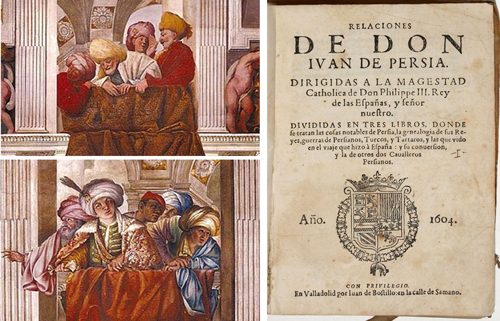Alberto Rubio
The embassy that Shāh Abbās the Great sent to Felipe III to try to form a great alliance against the Ottoman Empire failed, but it left behind extraordinary stories such as those of Don Juan, Don Diego and Don Felipe of Persia. Three Shiite nobles converted to Christianity in the Court of King Felipe III.
The embassy, headed by Husain Ali Beg, as was published yesterday by The Diplomat, did not achieve the results the King of Persia, Abbas I, had hoped for. Not only because it did not manage to convince the Spanish monarch to launch hostilities against the Ottoman Empire, but because six of the men who made up the embassy ended abjuring from Islam. Three of them remained in Spain.
If during the retinue’s passage through Rome three of its members decided to convert, in Spain matters deteriorated for the head of the legation. His own nephew and second secretary, Ali Quli Beg; his third secretary, Buniyad Beg; and Uruch Beg, himself, first secretary, decided to embrace the Catholic faith, and did not leave with the rest of the embassy when it sailed from Lisbon to return to the Strait of Hormuz. To add insult to injury the ulama that was acting as a councillor, who went by the name of Amyr, was assassinated in a strange brawl in Mérida.
So Uruch Beg himself explains it in his “Relaciones”, the diary he wrote during the trip that took this extraordinary embassy through Russia, Prague, Rome and Valladolid, among other European cities, in the search for allies against the Sublime Porte.
Ali Quli Beg took the name Felipe of Persia, since his godparent was none other than the King of Spain. Uruch Beg was baptized as Juan of Persia and the third secretary, Bunyad Beg, took the name of Diego of Persia.
About his own experience, Don Juan explains that “as soon as I arrived in Valladolid I went to see Ali Quli Beg (who had already converted) at the Jesuit House, and as soon as began speaking to him (…) it became evident that God Almighty wished for a miracle to happen to me”. After this, both convinced Bunyad Beg.
Don Juan, who admits that he adopted his decision despite “not having received sufficient instruction” in the Catholic faith, had to even dodge an assassination attempt. The Persian ambassador, seeing that he was unsuccessful in his attempts to dissuade him, contracted an Turkish assassin to kill him. It was logical, seeing as the legate was going to have a lot of explaining to do before King Abbas for returning to Isfahan without seven of his dignitaries. This without taking into account the failure of the mission’s principle aim; the anti-Turkish alliance.
Don Juan died in Valladolid, in 1604, months after the “Relaciones” were published. In them the magnificence of the Spanish Court stands out, as well as the impression caused on the visiting Persian dignitaries by countries such as Segovia and Toledo. They are, in any case, the exceptional chronicle of a man of the XVII century, a man between two worlds, the East and the West.







